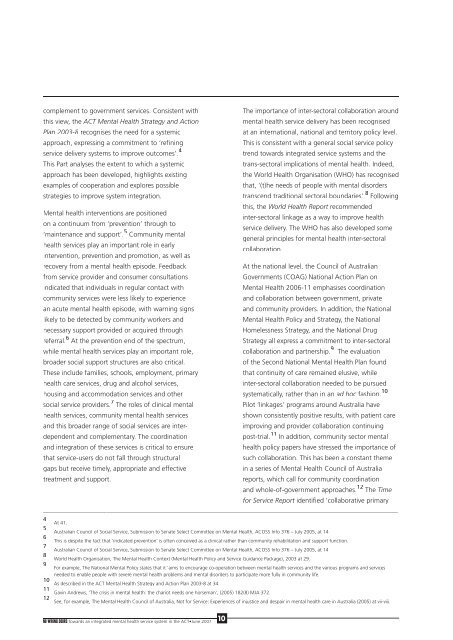actcoss text final.indd - ACT Council of Social Service
actcoss text final.indd - ACT Council of Social Service
actcoss text final.indd - ACT Council of Social Service
You also want an ePaper? Increase the reach of your titles
YUMPU automatically turns print PDFs into web optimized ePapers that Google loves.
complement to government services. Consistent with<br />
this view, the <strong>ACT</strong> Mental Health Strategy and Action<br />
Plan 2003-8 recognises the need for a systemic<br />
approach, expressing a commitment to ‘refining<br />
service delivery systems to improve outcomes’. 4<br />
This Part analyses the extent to which a systemic<br />
approach has been developed, highlights existing<br />
examples <strong>of</strong> cooperation and explores possible<br />
strategies to improve system integration.<br />
Mental health interventions are positioned<br />
on a continuum from ‘prevention’ through to<br />
‘maintenance and support’. 5 Community mental<br />
health services play an important role in early<br />
intervention, prevention and promotion, as well as<br />
recovery from a mental health episode. Feedback<br />
from service provider and consumer consultations<br />
indicated that individuals in regular contact with<br />
community services were less likely to experience<br />
an acute mental health episode, with warning signs<br />
likely to be detected by community workers and<br />
necessary support provided or acquired through<br />
referral. 6 At the prevention end <strong>of</strong> the spectrum,<br />
while mental health services play an important role,<br />
broader social support structures are also critical.<br />
These include families, schools, employment, primary<br />
health care services, drug and alcohol services,<br />
housing and accommodation services and other<br />
social service providers. 7 The roles <strong>of</strong> clinical mental<br />
health services, community mental health services<br />
and this broader range <strong>of</strong> social services are interdependent<br />
and complementary. The coordination<br />
and integration <strong>of</strong> these services is critical to ensure<br />
that service-users do not fall through structural<br />
gaps but receive timely, appropriate and effective<br />
treatment and support.<br />
The importance <strong>of</strong> inter-sectoral collaboration around<br />
mental health service delivery has been recognised<br />
at an international, national and territory policy level.<br />
This is consistent with a general social service policy<br />
trend towards integrated service systems and the<br />
trans-sectoral implications <strong>of</strong> mental health. Indeed,<br />
the World Health Organisation (WHO) has recognised<br />
that, ‘(t)he needs <strong>of</strong> people with mental disorders<br />
transcend traditional sectoral boundaries’. 8 Following<br />
this, the World Health Report recommended<br />
inter-sectoral linkage as a way to improve health<br />
service delivery. The WHO has also developed some<br />
general principles for mental health inter-sectoral<br />
collaboration.<br />
At the national level, the <strong>Council</strong> <strong>of</strong> Australian<br />
Governments (COAG) National Action Plan on<br />
Mental Health 2006-11 emphasises coordination<br />
and collaboration between government, private<br />
and community providers. In addition, the National<br />
Mental Health Policy and Strategy, the National<br />
Homelessness Strategy, and the National Drug<br />
Strategy all express a commitment to inter-sectoral<br />
collaboration and partnership. 9 The evaluation<br />
<strong>of</strong> the Second National Mental Health Plan found<br />
that continuity <strong>of</strong> care remained elusive, while<br />
inter-sectoral collaboration needed to be pursued<br />
10<br />
systematically, rather than in an ad hoc<br />
fashion.<br />
Pilot ‘linkages’ programs around Australia have<br />
shown consistently positive results, with patient care<br />
improving and provider collaboration continuing<br />
post-trial. 11 In addition, community sector mental<br />
health policy papers have stressed the importance <strong>of</strong><br />
such collaboration. This has been a constant theme<br />
in a series <strong>of</strong> Mental Health <strong>Council</strong> <strong>of</strong> Australia<br />
reports, which call for community coordination<br />
and whole-<strong>of</strong>-government approaches. 12 The Time<br />
for <strong>Service</strong> Report identified ‘collaborative primary<br />
___________________________________________________________________________________________________________________________<br />
4<br />
At 41.<br />
5<br />
Australian <strong>Council</strong> <strong>of</strong> <strong>Social</strong> <strong>Service</strong>, Submission to Senate Select Committee on Mental Health, ACOSS Info 376 – July 2005, at 14.<br />
6<br />
This is despite the fact that ‘indicated prevention’ is <strong>of</strong>ten conceived as a clinical rather than community rehabilitation and support function.<br />
7<br />
Australian <strong>Council</strong> <strong>of</strong> <strong>Social</strong> <strong>Service</strong>, Submission to Senate Select Committee on Mental Health, ACOSS Info 376 – July 2005, at 14<br />
8<br />
World Health Organisation, The Mental Health Con<strong>text</strong> (Mental Health Policy and <strong>Service</strong> Guidance Package), 2003 at 29.<br />
9<br />
For example, The National Mental Policy states that it ‘aims to encourage co-operation between mental health services and the various programs and services<br />
needed to enable people with severe mental health problems and mental disorders to participate more fully in community life.<br />
10 As described in the <strong>ACT</strong> Mental Health Strategy and Action Plan 2003-8 at 34.<br />
11 Gavin Andrews, ‘The crisis in mental health: the chariot needs one horseman’, (2005) 182(8) MJA 372.<br />
12 See, for example, The Mental Health <strong>Council</strong> <strong>of</strong> Australia, Not for <strong>Service</strong>: Experiences <strong>of</strong> injustice and despair in mental health care in Australia (2005) at vii-viii.<br />
NO WRONG DOORS Towards an integrated mental health service system in the <strong>ACT</strong>•June 2007<br />
10













